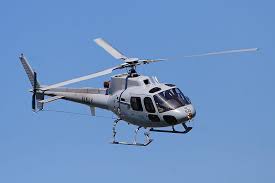helicopter
英 [ˈhel.ɪˌkɒp.tər]
美 [ˈhel.əˌkɑːp.tɚ]
- n. [航] 直升飞机
- vi. [航] 乘直升飞机
- vt. 由直升机运送
使用频率:

记忆方法
记忆单词“helicopter”可以采用以下方法:
1. 分解记忆:“helico-”部分类似于“helix”,即螺旋,联想到螺旋状;“-pter”部分与“penguin”中的“pter”相似,即翅膀。将这两部分结合起来,想象一个螺旋上升的带有翅膀的“企鹅”,这就是直升机的样子。
1. 分解记忆:“helico-”部分类似于“helix”,即螺旋,联想到螺旋状;“-pter”部分与“penguin”中的“pter”相似,即翅膀。将这两部分结合起来,想象一个螺旋上升的带有翅膀的“企鹅”,这就是直升机的样子。
以上内容由AI生成, 仅供参考和借鉴
中文词源
helicopter 直升机
helico-,螺旋,-pter,翅膀,词源同feather,pterodactyl.比喻用法。
英语词源
- helicopter
-
helicopter: [19] The term helicopter was coined in the mid-19th century from Greek hélix ‘spiral’ (source of English helix [16] and helical [17]) and Greek ptéron ‘wing’ (source of English pterodactyl and related to feather). The French were first in the field with hélicoptère, and the earliest record of the word in English, in 1861, was the barely anglicized helicoptere, but by the late 1880s the modern form helicopter was being used. (These 19th-century helicopters were of course a far cry from the present-day rotorblade- driven craft, which were introduced in the late 1930s; as their name suggests, they were lifted – or more usually not lifted – by rotating spiral-shaped aerofoils.)
=> feather, helical, helix, pterodactyl - helicopter (n.)
- 1861, from French hélicoptère "device for enabling airplanes to rise perpendicularly," thus "flying machine propelled by screws." The idea was to gain lift from spiral aerofoils, and it didn't work. Used by Jules Verne and the Wright Brothers, the word transferred to helicopters in the modern sense when those were developed in the 1920s. From Greek helix (genitive helikos) "spiral" (see helix) + pteron "wing" (see pterodactyl). Nativized in Flemish as wentelwiek "with rotary vanes."
权威例句
- 1. A helicopter crashed in a fiery explosion in Vallejo.
- 一架直升机在瓦列霍爆炸起火并坠毁。
- 2. A black Mercedes screeched to a halt beside the helicopter.
- 一辆黑色的梅赛德斯轿车在直升机旁嘎的一声刹住了。
- 3. She served six months in prison for the helicopter caper.
- 她因为直升机一案坐了6个月牢。
- 4. The helicopter crash landed when one of its two engines cut out.
- 直升机的两个发动机中有一个停止运转,只好迫降了。
- 5. The silence was broken by the whirring of a helicopter.
- 直升机的嗡嗡声打破了沉寂。